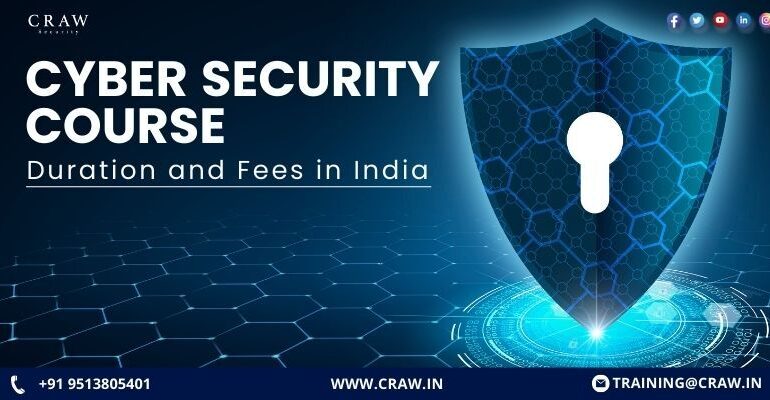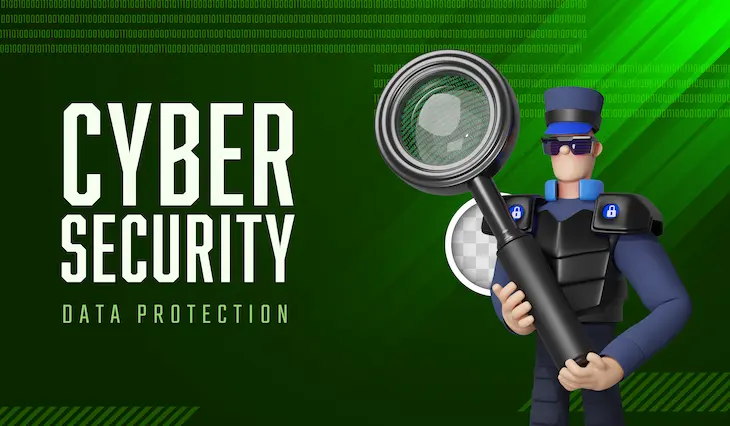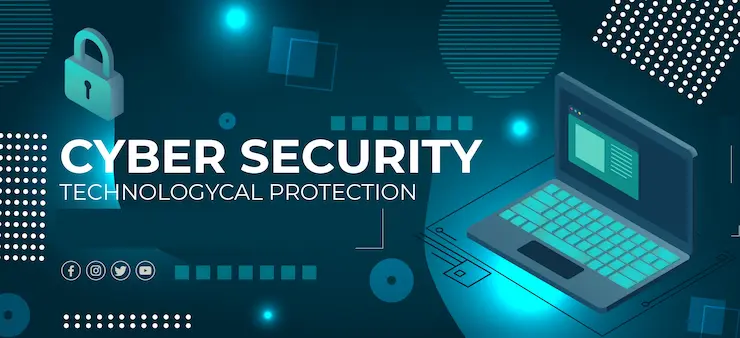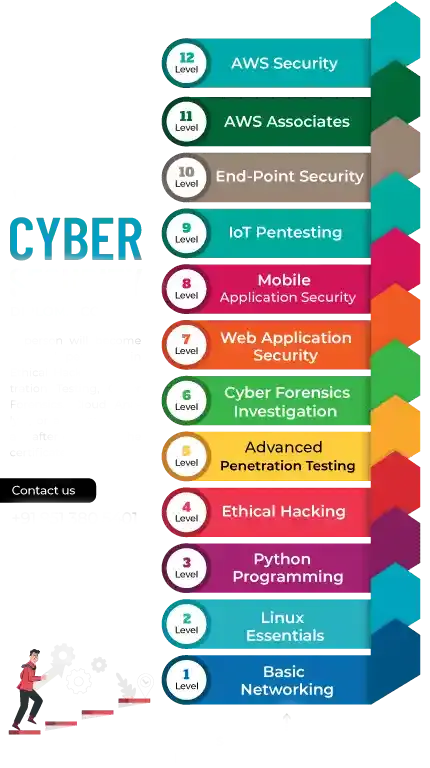Cyber Security Course Duration and Fees in India

Cyber Security Course Duration and Fees in India
Cyber Security Course Duration and Fees
The emerging discipline of cybersecurity has assumed paramount importance in safeguarding data and information systems in the contemporary digital age. The demand for qualified cyber security specialists in India, a country seeing significant growth in its tech industry, is increasing. Consequently, there has been a notable surge in the accessibility of cybersecurity courses. Let’s explore the duration and fees associated with these courses in India.
Introduction to Cyber Security Courses in India
- Overview of Cyber Security Importance
The issue of cyber security has emerged as a significant worry in the contemporary era of digital technology, whereby substantial quantities of confidential information are stored and exchanged across the internet and other networks. The escalating dependence on technology across several industries, encompassing government, banking, healthcare, and retail, has rendered information systems vulnerable to cybercriminal activities. Cyber attacks encompass a wide range of malicious activities, including but not limited to data breaches, ransomware incidents, identity theft, and phishing attempts.
These nefarious actions provide substantial hazards to individuals, corporations, and even the realm of national security. In light of the aforementioned statement, it can be observed that the field of cyber security has undergone significant advancements, transforming into a pivotal area of study that centers on safeguarding various technological infrastructures, networks, and information repositories against potential threats originating from the digital realm.

Moreover, the significance of this discipline extends beyond the prevention of cyber attacks, encompassing the development of robust systems capable of enduring and recuperating from prospective breaches. The implementation of robust cyber security protocols is vital for the protection of privacy, preservation of data integrity, maintenance of service continuity, and establishment of trust in digital platforms.
- Rising Demand for Cyber Security Professionals
The increasing scale and intricacy of cyber threats have resulted in a significant need for proficient cybersecurity experts in both India and worldwide. The increasing demand for fortifying digital infrastructures by enterprises and organizations is primarily motivated by the necessity to protect against a continuously expanding range of cyber threats. The increasing prevalence of internet-connected devices and the emergence of technologies such as cloud computing and the Internet of Things (IoT) have resulted in a greater number of potential targets for malicious assaults.
As a result, there is an increasing demand for those with the expertise to proactively anticipate, identify, and effectively address a wide array of cybersecurity risks. The demand for cyber security is not restricted solely to huge enterprises, but also encompasses small and medium-sized businesses, as they are progressively acknowledging the significance of this field. The increasing need for cybersecurity professionals is evident through the expanding quantity of job advertisements for positions such as cybersecurity analysts, ethical hackers, security architects, and compliance officers. The discipline not only presents a wide range of professional prospects but also guarantees dynamic and demanding positions for individuals who are inclined towards safeguarding the digital domain.
Understanding Cyber Security Courses
- What are Cyber Security Courses?
Cybersecurity courses are scholastic initiatives that aim to impart to learners the requisite expertise and competencies to safeguard computer systems, networks, and data against cyber threats. The subject matter addressed in these courses is extensive and includes network security, information security, ethical hacking, cryptography, and cyber laws, among others. Individuals are to be prepared to recognize vulnerabilities, repel attacks, and respond to security incidents as a result of completing these courses. Training in cyber security is essential for the development of personnel who can defend against ever more sophisticated cyber threats. These courses accommodate individuals with diverse levels of expertise, ranging from novices venturing into the realm of cyber security to seasoned practitioners aiming to augment their capabilities or develop expertise in particular domains.
- Types of Cyber Security Courses Available
The field of Cyber Security Courses encompasses a wide range of programs that cater to unique learning requirements and professional ambitions:
- Certificate and Diploma Courses,
- Undergraduate and Postgraduate Degree Programs,
- Online Courses and MOOCs,
- Professional Certification Programs,
- Workshops and Bootcamps,
- Corporate Training Programs, etc.
Duration of Cyber Security Courses
- Short-Term Courses
Short-term courses in the field of Cyber Security are specifically structured to offer concentrated and rigorous educational experiences within a limited timeframe, often spanning from a few weeks to several months. These courses are well-suited for those who desire to acquire targeted skills expeditiously or for professionals aiming to enhance their knowledge in specific domains of cyber security. Short-term courses frequently encompass subject matters such as ethical hacking, rudimentary network security, fundamental principles of cybersecurity, or particular tools and technologies.
These resources are available in diverse formats, encompassing online courses, workshops, and certificate programs provided by both educational institutions and private training providers. The condensed format of these courses renders them appropriate for individuals with demanding professional schedules or students seeking to enhance their current educational background or professional expertise through focused cybersecurity competencies.
- Long-Term Courses
Long-term courses in the field of Cyber Security provide a complete and extensive educational experience, generally spanning from months to years. The academic offerings encompass both undergraduate and postgraduate degree programs, specifically Bachelor’s and Master’s degrees in Cyber Security, often requiring a duration of three to four years and two years, respectively. Long-term courses offer comprehensive knowledge encompassing several subjects, spanning from fundamental principles in computer science to intricate notions in network security, cryptography, and ethical hacking. This program is particularly suitable for students who are dedicated to establishing a strong groundwork and pursuing a professional trajectory in the field of cyber security.
Furthermore, extended-duration courses frequently integrate theoretical instruction with hands-on opportunities, such as laboratory sessions, internships, and project-based assignments, to equip students with the necessary skills and knowledge to tackle the complexities inherent in practical cybersecurity positions.
Factors Affecting Course Duration
- Course Type (Degree, Diploma, Certification)
The length of a cyber security course is notably impacted by the specific sort of course being undertaken:
| Course Type | Description |
| Degree Courses | These programs are comprehensive in nature, similar to Bachelor’s and Master’s degrees. A normal duration for a Bachelor’s degree program in Cyber Security is typically three to four years, but a Master’s degree program generally requires a two-year commitment. These programs provide a comprehensive curriculum that encompasses a wide range of topics within the field of cyber security. |
| Diploma Courses | Diploma programs in the field of Cyber Security typically exhibit a shorter duration in comparison to degree programs, typically spanning a period of six months to one year. These courses offer a more concentrated educational opportunity, with a specific emphasis on essential aspects of cyber security. |
| Certification Courses | These programs are characterized by a high degree of specialization and exhibit a wide range of durations, typically spanning from a few weeks to several months. Certification courses in the field of cyber security are designed to provide specialized training in particular skills or tools. Examples of such courses include the Certified Ethical Hacker (CEH) and CompTIA Security+. |
- Institution Type (Online, Offline)
Additionally, the format of the institution that provides the course influences its duration:
| Course Type | Description |
| Online Courses | The versatility of online courses permits students to advance at their own rate. As a result, the duration of the course may differ, as certain students may finish it in a shorter time period than others, owing to the self-paced format. |
| Offline (In-Person) Courses | Conventional on-site courses, provided by academic institutions and training facilities, adhere to a rigid timetable and possess a more organized structure. The courses frequently adhere to predetermined timetables or academic semesters, resulting in a more consistent duration for each course. |
Overview of Cyber Security Course Fees

- Fee Range for Different Courses
In India, the cost of cyber security courses varies considerably, contingent upon the course’s nature and level of complexity:
| Degree Courses | These courses, which sometimes encompass certifications such as CEH or CompTIA Security+, often span a price range of INR 5,000 to INR 50,000. The cost of a course is determined by factors such as the substance of the course and the reputation of the certifying organization. |
| Diploma Courses | The prices for diploma programs may vary from INR 20,000 to INR 1,00,000. These courses often provide a more extensive curriculum compared to certification courses and are typically of longer duration. |
| Certification Courses | Bachelor’s and Master’s degree programs in cyber security typically have a higher tuition price structure, typically ranging from INR 1,00,000 to INR 3,00,000 per annum. The fees associated with these programs may exhibit substantial variation depending on the level of prestige of the school and the extent of comprehensiveness offered by the program. |
- Factors Influencing Course Fees
Several factors contribute to the variation in course fees for cyber security education:
| Institution Reputation | Prominent educational institutions or colleges frequently impose higher tuition fees as a result of their well-established reputation and the superior standard of instruction they offer. |
| Course Content and Depth | Courses that offer more extensive coverage of various topics with greater depth generally come at a higher cost compared to courses that concentrate on certain, narrow subject areas. |
| Mode of Delivery | Online courses may offer a more cost-effective alternative to in-person training in certain instances. However, it is important to note that this is not universally applicable, particularly when considering courses provided by esteemed universities or platforms. |
| Certification and Accreditation | Courses that possess recognized certificates or are approved by prestigious organizations may command a higher fee owing to the enhanced value they contribute to the student’s professional portfolio. |
| Additional Resources and Materials | The inclusion of abundant resources, such as laboratory access, study materials, software tools, and examination vouchers, within courses can also exert an impact on the overall financial expenditure. |
Top Institutions Offering Cyber Security Courses in India
- Government and Private Institutions
In the Indian context, it is noteworthy that both governmental and private entities provide a diverse array of cybersecurity courses, effectively addressing the escalating need for expertise in this particular domain:
| Government Institutions | Prominent educational institutions under governmental administration provide academic programs in the field of cyber security. The institutions in question encompass the Indian Institutes of Technology (IITs) and the National Institutes of Technology (NITs), renowned for their commitment to delivering high-quality education and fostering a research-centric environment. Government colleges frequently provide complete degree programs, such as Bachelor of Technology (B.Tech) and Master of Technology (M.Tech) in the field of Cyber Security. These programs are commonly perceived as being more cost-effective in comparison to their private counterparts. |
| Private Institutions | Several private institutions and colleges in India have recently initiated the provision of specialist courses in the field of cyber security. These educational institutions, namely Amity University, Lovely Professional University, and Manipal Academy of Higher Education, provide a diverse range of academic programs encompassing both undergraduate and postgraduate degrees as well as diploma courses. Private colleges are renowned for their contemporary facilities, strong industry affiliations, and occasionally, a wider array of course options. Nevertheless, it is worth noting that the fee structure of private universities may be comparatively greater when compared to that of government institutions. |
- Online Learning Platforms
Online learning platforms have gained significant traction as a viable substitute for cyber security education due to their adaptable nature and extensive course offerings:
| Massive Open Online Course (MOOC) Providers | Online learning platforms such as Super Learning, Coursera, Udemy, and edX provide a diverse range of cyber security courses, encompassing both complimentary and fee-based alternatives. These courses are frequently developed in collaboration with universities or industry professionals, offering information of superior quality that spans across many proficiency levels, ranging from introductory to advanced. |
| Specialized Cyber Security Training Platforms | Specialized platforms exist that are specifically designed for the purpose of providing cyber security training. Examples of such platforms include Craw Security, Bytecode Security, Cybrary, and Infosec Institute. These platforms provide specialized training programs, courses designed to prepare individuals for certification, and practical laboratory experiences, all tailored to meet the needs of anyone seeking to enter the field of cyber security. |
| Industry Certifications | Online platforms also provide preparatory courses for internationally renowned industry certifications such as the Certified Information Systems Security Professional (CISSP), Certified Ethical Hacker (CEH), and CompTIA Security+. The aforementioned certificates hold substantial importance within the industry and have the potential to greatly augment one’s career opportunities. |

Curriculum and Syllabus Overview
- Core Topics Covered
The curriculum of cyber security courses generally includes a wide array of fundamental subjects that are crucial for establishing a strong basis in this discipline:
| Network Security | This academic study encompasses the comprehension of fundamental principles pertaining to the security of computer networks, which involves the examination of firewalls, intrusion detection systems, and network protocols. |
| Information Security Management | The acquisition of knowledge pertaining to the techniques and methodologies employed in safeguarding information assets from potential threats and vulnerabilities. |
| Ethical Hacking and Penetration Testing | This course focuses on the acquisition of skills related to the identification of vulnerabilities in systems and networks, as well as the simulation of cyber assaults for the purpose of evaluating the effectiveness of security measures. |
| Cryptography | This paper provides an overview of the fundamental concepts and techniques involved in the encryption and decryption of data. It encompasses a comprehensive examination of several aspects, such as algorithms, key management, and cryptographic protocols. |
| Cyber Laws and Ethics | This paper provides a comprehensive examination of the legal frameworks and ethical concerns that are pertinent to the implementation of cyber security measures. |
| Incident Response and Disaster Recovery | The acquisition of skills pertaining to the management of security breaches and the subsequent restoration of systems and operations in the aftermath of an attack. |
| Emerging Technologies and Trends | In order to remain up-to-date with the most recent advancements in technology, it is imperative to stay informed on topics such as cloud security, Internet of Things (IoT) security, and the integration of artificial intelligence (AI) in the field of cyber security. |
- Practical vs Theoretical Learning
Cybersecurity courses frequently aim to achieve a harmonious integration of practical and theoretical learning, recognizing the significance of both aspects within this domain.
| Practical Learning | Practical experience is a crucial element of cyber security education. The educational activities encompass laboratory experiments, computer simulations, and real-life case analyses, enabling students to effectively apply their acquired knowledge to actual situations. Proficiency in utilizing security technologies, executing penetration testing, and effectively addressing simulated cyber threats is cultivated through hands-on practical exercises. |
| Theoretical Learning | The acquisition of theoretical information serves as the fundamental basis upon which practical abilities are subsequently developed. The field of study encompasses the examination of fundamental concepts, principles, and approaches that are crucial for comprehending the intricate nature of cyber security. The theory encompasses a wider scope within the realm of cyber security, encompassing aspects such as policy, governance, and ethical considerations. |
Career Opportunities After Cyber Security Courses
- Job Roles and Sectors
Completing cyber security courses grants access to a vast array of sectors and job positions, reflecting the increasing significance of this field in numerous industries:
| Job Roles | Upon completion of their studies, individuals who have obtained a degree can opt for a range of professional positions, including but not limited to Cyber Security Analyst, Ethical Hacker, Security Architect, Incident Response Manager, and Information Security Manager. Additional specialized positions within the field of cyber security encompass the Network Security Engineer, Penetration Tester, and Compliance Officer, each of which is dedicated to distinct facets of the discipline. |
| Sectors | Opportunities are present across a wide range of sectors, encompassing IT and software enterprises, financial institutions, government agencies, healthcare organizations, and consulting firms. The increasing prevalence of cyber risks has prompted non-traditional sectors to allocate resources towards enhancing their cyber security measures, hence contributing to the broader expansion of employment opportunities in this field. |
- Expected Salary Range
In India, the compensation spectrum for cyber security personnel is subject to variation, contingent upon employer industry, location, professional experience, and job function:
| Entry-Level Positions | Annual salaries for recent graduates or individuals with limited work experience can vary between INR 3,00,000 and INR 6,00,000. Entry-level positions generally entail fundamental security responsibilities with a progressive enhancement of expertise. |
| Mid-Level Roles | Experts in their field can earn between INR 6,00,000 and INR 12,00,000 annually with a few years of experience. Higher-level positions entail more substantial obligations, such as overseeing specialized security domains or providing guidance to small groups. |
| Senior-Level Roles | Proficient cyber security experts, particularly those occupying senior management or specialized technical roles, are capable of earning annual salaries ranging from INR 12,000,000 to INR 3,000,000 or more. Leadership experience and expertise in particular facets of cyber security are frequently required for these positions. |
Future Trends in Cyber Security Education
Evolving Technologies
The field of cyber security education is perpetually influenced and reconfigured by the progressive advancements in technology. The emergence of these breakthroughs presents novel difficulties and opportunities for learning within the field of cyber security.
- Artificial Intelligence and Machine Learning,
- Internet of Things (IoT) Security,
- Cloud Security,
- Blockchain Technology, etc.
Industry Demands
The field of cyber security education is influenced by the changing demands of the industry, as firms and organizations strive to tackle the intricate and ever-changing landscape of contemporary cyber threats:
- Skill-Based Training,
- Compliance and Legal Aspects,
- Interdisciplinary Approach,
- Adaptability and Continuous Learning, etc.

FAQs
About Cyber Security Course Duration and Fees in India
1: What is cyber security course duration?
Different institutions have their own set of timelines to deliver their authentic cybersecurity courses. However, the Diploma in Cyber Security by Craw Security is delivered in a detailed manner in a long span of 1 year with 12 courses that will certainly assist an individual to become a specialist in cybersecurity.
2: Can I learn cyber security in 3 months?
Typically, the duration of cyber security online courses ranges from 3 to 6 months. Upon successful completion of the course within the designated timeframe, individuals will attain certification as qualified cybersecurity experts after completing the 1 Year Diploma in Cyber Security Course by Craw Security, the best cybersecurity training institute in India.
3: Can I learn cyber security in 2 years?
There are several bachelor courses of 3-year duration that you may try to learn in-depth cybersecurity. On the other hand, Craw Security is the leading cybersecurity training institute in India that offers quality cybersecurity training programs in the shape of 1 Year Diploma in Cyber Security Course facilitated by high-end quality training professionals.
4: Is cyber security a tough job?
Yes, cyber security seems a tough job as it possesses long tiring workloads on a daily basis.
5: Is cyber security easy to study?
With the highly qualified and professional training experts by Craw Security, the cybersecurity training program becomes pretty easy to understand. To know more about the demo sessions or the upcoming batches in line, you may give us a call at our hotline mobile number at +91-9513805401 and have a word with our highly experienced educational counselors.
6: Who is eligible for cyber security?
Any person who is a newbie or a professional willing to grab more detail in the trajectory of cyber security can opt for the magnificent courses in cybersecurity, such as the 1 Year Diploma in Cyber Security Course by Craw Security, the Best Cybersecurity Training Institute in India.
7: Does cyber security pay well?
As per Ambition Box, the average yearly compensation for a mid-career cyber security professional with 4–9 years of experience is ₹10.6 Lakhs, while the average annual salary for an experienced cyber security professional with 10–20 years of experience is ₹26.1 Lakhs.
8: Is cyber security in high demand?
The need for cybersecurity professionals is predicted to increase by 18% over the next five years, indicating a strong level of need. Protecting computer networks and data against unwanted access, usage, or destruction is the focus of the cybersecurity field. Professionals in cybersecurity come in a wide variety and range of skill sets.
9: Which field of cyber security is best?
The varied fields of cyber security that tend to be the best are mentioned below:
- Chief Information Security Officer – CISO,
- Security Architect,
- Cybersecurity Engineer,
- Malware Analyst,
- Penetration Tester,
- Computer Forensics Analyst,
- Application Security Engineer, etc.
10: What subjects do I need to study cyber security?
Some of the most popular Cybersecurity-related subjects one can study are:
- Cyber and Digital Forensics,
- Network Security,
- Security Economics and Policy,
- Cyber Security Design and Analysis,
- Cybersecurity: Risk Management,
- Programming Languages (JAVA, Python, SQL, PHP),
- VAPT, etc.
11: Are there any free Cyber Security courses available in India?
The government-sponsored cyber security course in India frequently includes instructional modules on ethical hacking and vulnerability assessment. These modules aim to equip students with the knowledge and skills necessary to comprehend and discern potential vulnerabilities within systems, hence enhancing their ability to safeguard against harmful cyber attacks.
Conclusion
To wrap up, we would like to say that there are several institutions in the wild that offer good cyber security course duration and fees in India, which any interested learner can take advantage of. In this regard, Craw Security is the leading cybersecurity training institute in India situated in the capital city of India — New Delhi at Saket and Laxmi Nagar locations. To get more information on upcoming batches and other relevant stuff, you can visit the Official Website of Craw Security or give us a callback at our hotline mobile number +91-9513805401.


















